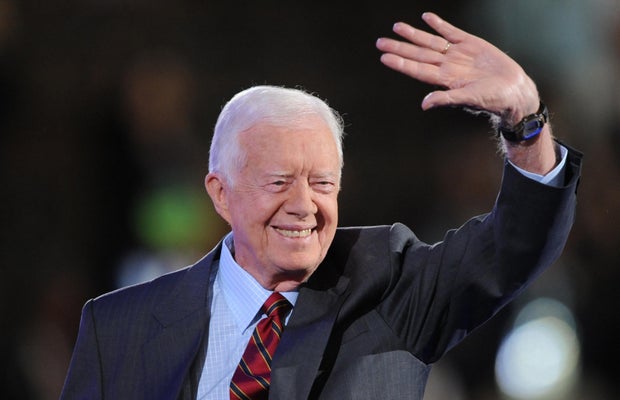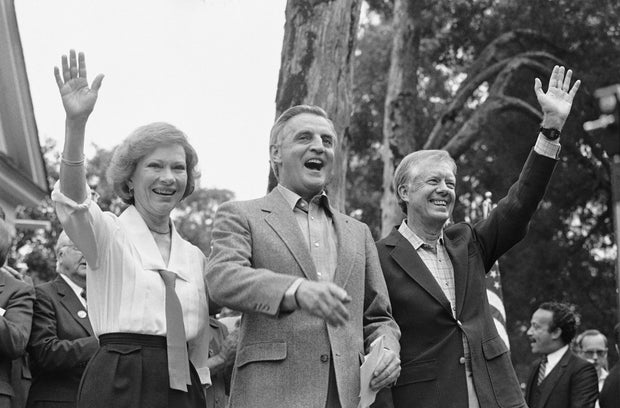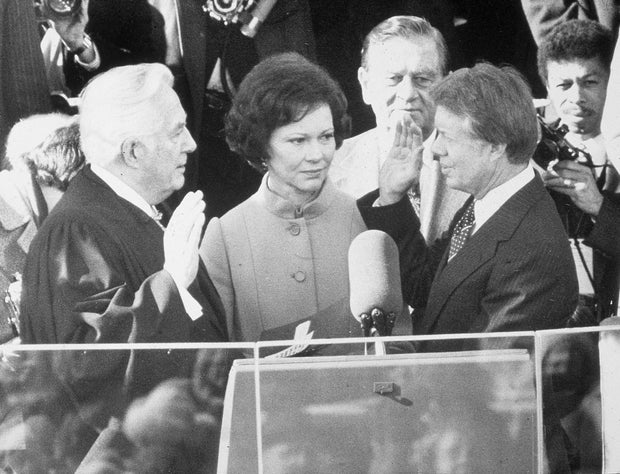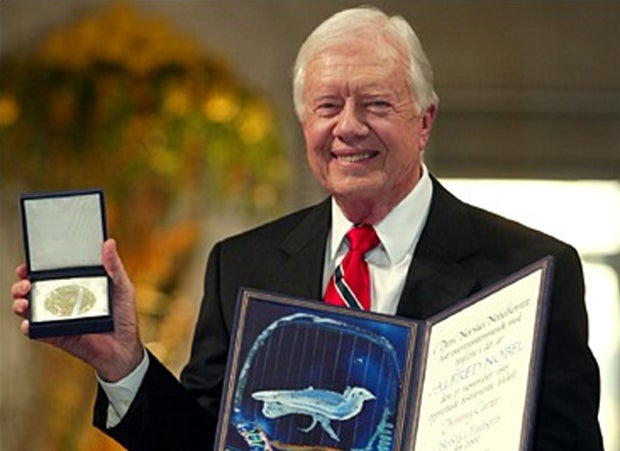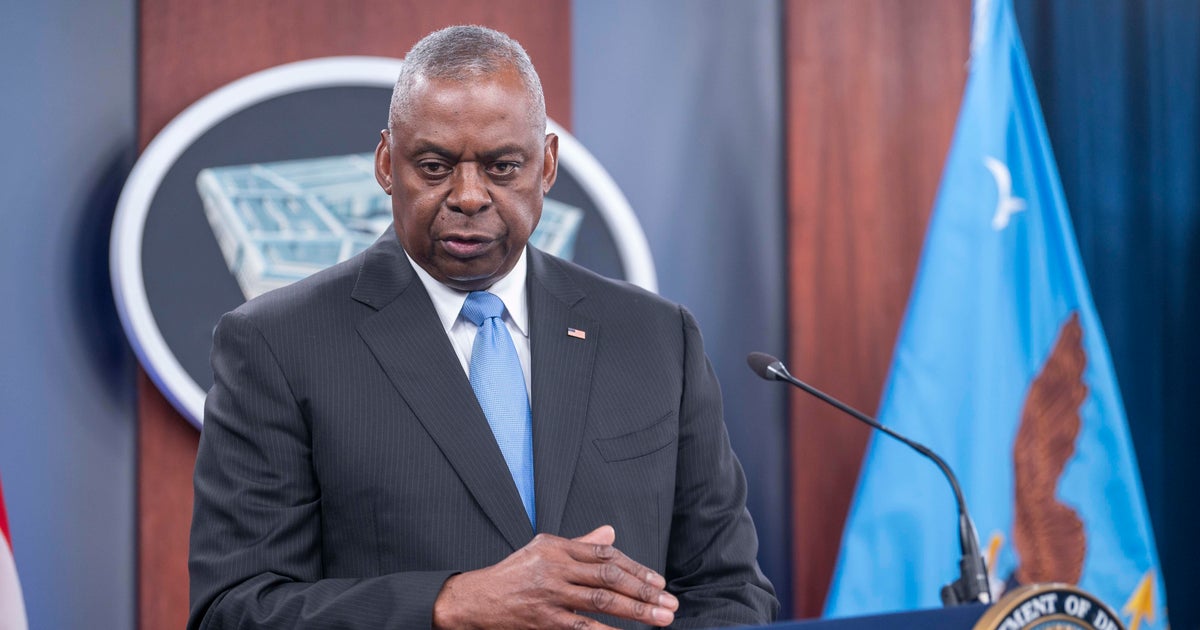Jimmy Carter, former president and Nobel Peace Prize winner, dies at age 100

Jimmy Carter, the 39th president of the United States, died Sunday at the age of 100. Though he served only one term in office, he went on to a distinguished second act of humanitarian work, and he lived long enough to become the oldest former president in U.S. history.
Carter “died peacefully Sunday, Dec. 29, at his home in Plains, Georgia, surrounded by his family,” the Carter Center announced in a statement.
“My father was a hero, not only to me but to everyone who believes in peace, human rights, and unselfish love,” said Chip Carter, the former president’s son, in a statement provided by the Carter Center. “My brothers, sister, and I shared him with the rest of the world through these common beliefs. The world is our family because of the way he brought people together, and we thank you for honoring his memory by continuing to live these shared beliefs.”
There will be public observances in Atlanta and Washington, D.C., followed by a private interment in Plains, Georgia, the Carter Center said.
In a proclamation Sunday night, President Biden declared Jan. 9 a national day of mourning for Carter and ordered that flags at federal facilities be flown as half-staff for 30 days.
Mr. Biden said Carter was “a man of character, courage, and compassion, whose lifetime of service defined him as one of the most influential statesmen in our history. He embodied the very best of America: A humble servant of God and the people. A heroic champion of global peace and human rights, and an honorable leader whose moral clarity and hopeful vision lifted our Nation and changed our world.”
In televised remarks Sunday evening, Mr. Biden said Carter “lived a life measured not by words, but by his deeds.”
“We would all do well to be a little more like Jimmy Carter,” the president said.
Carter had been receiving hospice care at his home for nearly two years following a series of short hospital stays. The Carter Center said in February 2023 that he had “decided to spend his remaining time at home with his family and receive hospice care instead of additional medical intervention.”
Carter remained active well into his 90s, continuing his work with Habitat for Humanity and the Carter Center and teaching Sunday school at his church in Plains, Georgia, even as his health began to falter.
Both in and out of office, Carter built a legacy as a tireless champion for peace and humanitarian causes. He brokered the landmark Camp David Accords in 1978, establishing a framework for peace in the Middle East, and he was awarded the Nobel Peace Prize in 2002 for his decades of work in advancing international peace, democracy and human rights.
Getty Images
While Carter had his share of accomplishments as president, his time in the White House, from 1977 to 1981, was tumultuous. His one term in office included the U.S. energy shortage and the Iran hostage crisis.
Carter rose on the national stage after Watergate, at a time when voters were looking for a change in politics.
“They didn’t want Ed Muskie or Hubert Humphrey or Scoop Jackson or George Wallace,” presidential historian Douglas Brinkley said. “They were tired of those people that had been in the national spotlight for so long. So, he came at America as a fresh new face.”
James Earl Carter Jr. was born on Oct. 1, 1924, in Plains. The son of a peanut farmer, he loved books and his Baptist faith.
At the U.S. Naval Academy, he studied nuclear science and graduated with distinction in 1946. That same year, he married a young woman named Rosalynn Smith — a marriage that would last for more than seven decades. They celebrated their 77th anniversary on July 7, 2023, the longest-married presidential couple in American history. She died months later, on Nov. 19, 2023, at age 96.
AP Photo/Lana Harris
Carter completed submarine training and served in the Navy for seven years before moving home to Georgia to run the family peanut farm. He and Rosalynn raised four children while his career focus shifted from farming to politics.
After eight years in state offices, Carter, a Democrat, was elected governor of Georgia in 1970. It was clear he was a new kind of Southern leader, one who emphasized racial equality and traditional values, at a time when the nation was in need of stability.
In 1976 — America’s bicentennial year — he defeated President Gerald Ford to become the 39th president of the United States. The Carters conveyed that they were of the people when they marched in the open air on the inaugural parade route.
Hulton Archive/Getty Images
“His greatest asset as a candidate was his outsider status,” Brinkley said. “And his greatest failing as a president was the fact that he remained an outsider, when you must be an insider in Washington if you’re going to be an effective president.”
He struggled to cultivate relationships in Washington and feuded openly with Democratic leaders in Congress. As oil prices and inflation soared, his popularity sank.
But there were accomplishments along the way. Carter created the departments of Energy and Education. He established formal diplomatic ties with China and returned control of the Panama Canal to the Panamanians.
Perhaps his greatest achievement was a historic peace treaty between Israel and Egypt, known as the Camp David Accords.
“Let history record that deep and ancient antagonism can be settled without bloodshed and without a staggering waste of precious lives,” Carter said at the signing of the peace treaty on March 26, 1979.
On Nov. 4, 1979, Iranian militants stormed the U.S. Embassy in Tehran, taking 52 Americans hostage. A U.S. military attempt to free them ended in disaster, with eight American servicemen killed in a crash. The crisis dominated Carter’s reelection campaign, while the economy continued to struggle and inflation topped 18%.
In the final days of his administration, the president and his team negotiated freedom for the hostages. They were released on Ronald Reagan’s Inauguration Day.
In the years after leaving the White House, the Carters established The Carter Center in Atlanta, with a mission to work toward advancing peace and global health.
“We can choose to alleviate suffering. We can choose to work together for peace. We can make these changes — and we must,” he said in 2002 as he formally accepted the Nobel Peace Prize for his decades of humanitarian work.
AP Photo
He and Rosalynn built houses with Habitat for Humanity, dedicating their efforts to the group for more than 30 years, and he penned more than 20 books.
He sparked controversy with his 2006 book “Palestine: Peace Not Apartheid,” in which he characterized Israel’s treatment of Palestinians as oppression. He later issued an open apology to the Jewish community, saying that suggestions for improvement should not stigmatize Israel.
In 2007, Carter spoke at the funeral of his former political rival turned close friend and confidante, former President Ford.
Chris Graythen / Getty Images
“One of my proudest moments was at the commemoration of the 200th birthday of the White House, when two noted historians both declared that the Ford-Carter friendship was the most intensely personal between any two presidents in history,” Carter said.
Carter announced in August 2015 that he had been diagnosed with cancer, a form of melanoma that had spread to his liver and his brain. Though he curtailed his activities with The Carter Center, he continued to fundraise for the organization, and also continued teaching Sunday school classes in Plains, a tradition he started in his teens.
Carter was treated with a new immunotherapy drug and made a remarkable recovery, sharing the news six months later that an MRI showed no signs of cancer.
In May 2019, he suffered another health setback, falling and breaking his hip. He went home from the hospital to recover and was soon back to teaching his Sunday school class. Carter suffered two more falls in October 2019 and was hospitalized for a fractured pelvis. A month later, he was admitted to a hospital in Atlanta for a surgical procedure to relieve pressure on his brain.
The Carter Center said in May 2023 that Rosalynn had been diagnosed with dementia; she continued to live at home with her husband until her death that November.
They are survived by their four children and many grandchildren and great-grandchildren.
During his many years after the White House, Carter planted seeds of peace, and sometimes seeds of controversy. But as one of the most active former presidents in history, many believe he defined the role for those who would follow.
World News || Latest News || U.S. News
Source link

